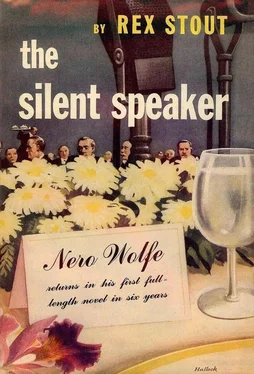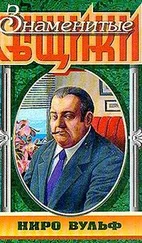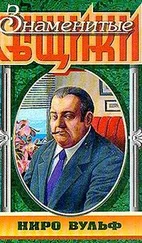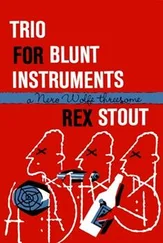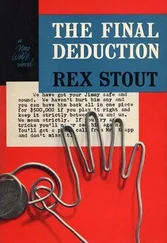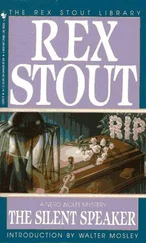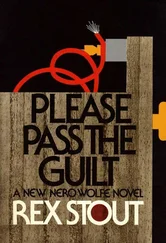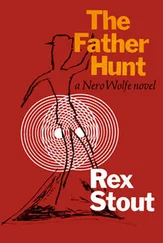I asked what.
Something, she said.
“Like catching the murderer?”
“That, of course.” She seemed to regard that as a mere detail. “But something to stop this insane hullabaloo. Perhaps a statement signed by a hundred prominent citizens. Or telegrams urging sermons tomorrow — tomorrow is Sunday—”
“Are you suggesting that Mr. Wolfe should send telegraphs to fifty thousand preachers and priests and rabbis?”
“No, of course.” Her hands fluttered. “But something — something—”
“Listen, P.R.” I patted her on the knee to quiet her. “You are stricken, I appreciate that. But the NIA seems to think this is a department store. Who you want is not Nero Wolfe but Russell Birdwell or Eddie Bernays. This is a specialty shop. All we’re going to do is catch the murderer.”
“Oh, my God,” she said. Then she added, “I doubt it.”
“Doubt what?” I stared at her. “That we’re going to catch him?”
“Yes. That anyone is.”
“Why?”
“I just doubt it.” She met my gaze, competently. Then her eyes changed. “Look, this is off the record?”
“Sure, you and me. And my boss, but he never tells anybody anything.”
“I’m fed up.” She worked her jaw like a man, no lip trembling. “I’m going to quit and get a job sewing on buttons. The day anyone catches the murderer of Cheney Boone, finds him and proves it on him, it will rain up instead of down. In fact it will—”
I nodded encouragingly. “What else will it do?”
She abruptly got to her feet. “I’m talking too much.”
“Oh, no, not enough. You’ve just started. Sit down.”
“No, thank you.” Her eyes were competent again. “You’re the first man I’ve collapsed in front of for a long, long time. For heaven’s sake, don’t get the idea that I know secrets and try to dig them out of me. It’s just that this thing is more than I can handle and I’ve lost my head. Don’t bother to let me out.”
She went.
When Wolfe came down to the office at six o’clock I reported the conversation in full. At first he decided not to be interested, then changed his mind. He wanted my opinion and I gave it to him, that I doubted if she knew anything that would help much, and even if she did she was through collapsing in front of me, but he might have a go at her.
He grunted. “Archie. You are transparent. What you mean is that you don’t want to bother with her, and you don’t want to bother with her because Miss Gunther has got you fidgeting.”
I said coldly, “I don’t fidget.”
“Miss Gunther has got you on a string.”
Usually I stay right with him when he takes that line, but there was no telling how far he might go in the case of Phoebe Gunther and I didn’t want to resign in the middle of a murder job, so I cut it off by going to the front door for the evening papers.
We get two of each, to avoid friction, and I handed him his share and sat at my desk with mine. I looked at the Gazette first, and on the front page saw headlines that looked like news. It was. Mrs. Boone had got something in the mail.
One detail that I believe I haven’t mentioned before was Boone’s wallet. I haven’t mentioned it because its being taken by the murderer provided no new angle on the crime or the motive, since he hadn’t carried money in it. His money had been in a billfold in his hip pocket and hadn’t been touched. He had carried the wallet in the breast pocket of his coat and used it for miscellaneous papers and cards, and it had not been found on the body, and therefore it was presumed that the murderer had taken it. The news in the Gazette was that Mrs. Boone had received an envelope in the mail that morning, with her name and address printed on it with a lead pencil, and in it had been two objects that Boone had always carried in the wallet: his automobile license and a photograph of Mrs. Boone in her wedding dress. The Gazette article remarked that the sender must be both a sentimentalist and a realist; sentimental, because the photo was returned; realist, because the auto license, which was still of use, had been returned, while Boone’s operator’s license, which he had also kept in the wallet, had not been. The Gazette writer was picturesque about it, saying that the operator’s license had been canceled with a monkey wrench.
“Indeed,” Wolfe said loud enough for me to hear. I saw that he was reading it too, and spoke:
“If the cops hadn’t already been there and got it, and if Miss Gunther didn’t have me on a string, I’d run up to see Mrs. Boone and get that envelope.”
“Three or four men in a laboratory,” Wolfe said, “will do everything to that envelope but split its atoms. Before long they’ll be doing that too. But this is the first finger that has pointed in any direction at all.”
“Sure,” I agreed, “now it’s a cinch. All we have to do is find out which of those one thousand four hundred and ninety-two people is both a sentimentalist and a realist, and we’ve got him.”
We went back to our papers.
Nothing more before dinner. After the meal, which for me consisted chiefly of thin toast and liver pâté on account of the way Fritz makes the pâté, we had just got back to the office again, a little before nine when a telegram came. I took it from the envelope and handed it to Wolfe, and after he had read it he passed it over to me. It ran:
NERO WOLFE 922 WEST 35 NYC
CIRCUMSTANCES MAKE IT IMPOSSIBLE TO
CONTINUE SURVEILLANCE OF ONEILL BUT
BELIEVE IT ESSENTIAL THIS BE DONE
ALTHOUGH CAN GUARANTEE NOTHING
BRESLOW
I put my brows up at Wolfe. He was looking at me with his eyes half open, which meant he was really looking.
“Perhaps,” he said witheringly, “you will be good enough to tell me what other arrangements you have made for handling this case without my knowledge?”
I grinned at him. “No, sir. Not me. I was about to ask if you have put Breslow on the payroll and if so at how much, so I can enter it.”
“You know nothing of this?”
“No. Don’t you?”
“Get Mr. Breslow on the phone.”
That wasn’t so simple. We knew only that Breslow was a manufacturer of paper products from Denver, and that, having come to New York for the NIA meeting, he was staying on, as a member of the Executive Committee, to help hold the fort in the crisis. I knew Frank Thomas Erskine was at the Churchill and tried that, but he was out. Hattie Harding’s number, which was in the phone book, gave me a don’t answer signal. So I tried Lon Cohen again at the Gazette , which I should have done in the first place, and learned that Breslow was at the Strider-Weir. In another three minutes I had him and switched him to Wolfe, but kept myself connected.
He sounded on the phone just the way he looked, red-faced with anger.
“Yes, Wolfe? Have you got something? Well? Well?”
“I have a question to ask—”
“Yes? What is it?”
“I am about to ask it. That was why I had Mr. Goodwin learn your number, and call it and ask for you, so you could be on one end of the telephone and me on the other end, and then I could ask you this question. Tell me when you are ready, sir.”
“I’m ready! Damn it, what is it?”
“Good. Here it is. About that telegram you sent me—”
“Telegram? What telegram? I haven’t sent you any telegram!”
“You know nothing about a telegram to me?”
“No! Nothing whatever! What—”
“Then it’s a mistake. They must have got the name wrong. I suspected as much. I was expecting one from a man named Bristow. I apologize, sir, for disturbing you. Good-by.”
Breslow tried to prolong the agony, but between us we got him off.
“So,” I remarked, “he didn’t send it. If he did, and didn’t want us to know it, why would he sign his name? Do we have it traced? Or do we save energy by assuming that whoever sent it knows about phone booths?”
Читать дальше
